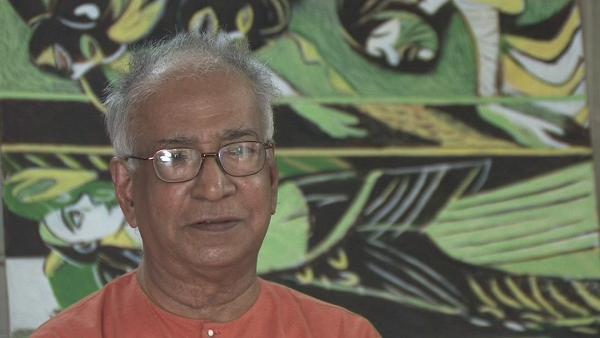NEXT STORY

Release from prison, Gopal Reddy and going to Santiniketan
RELATED STORIES

NEXT STORY

Release from prison, Gopal Reddy and going to Santiniketan
RELATED STORIES


|
Views | Duration | |
|---|---|---|---|
| 1. Childhood in Kerala | 1 | 394 | 03:07 |
| 2. Mahé, a ‘comic town’. Silk, schools and... | 133 | 03:51 | |
| 3. School in Mahé | 1 | 78 | 03:07 |
| 4. Mahé’s political underground – ‘I... | 85 | 02:10 | |
| 5. Wood sculptures, temples and study in Mangalore | 117 | 03:11 | |
| 6. Discovering the art of the rest of the world | 86 | 02:43 | |
| 7. From Economics at Presidency College, Madras to the Quit India... | 60 | 03:56 | |
| 8. The Madras Art School, Devi Prasad and a glass of scotch! | 112 | 03:37 | |
| 9. My father’s visit and getting sent to prison | 62 | 05:04 | |
| 10. Release from prison, Gopal Reddy and going to Santiniketan | 67 | 04:26 |

My father came when he heard that I was getting into trouble with the police, to persuade me not to get into trouble. But my father was old, permissive kind of person, so he came, he said, ‘I’m coming here to Madras after a very long time’. So I took him round Madras, and showed all the sort of sights of that time. Then after a day or two, he said, ‘Now I should go back home’. And he didn’t tell me why he had come. Only when I put him on the train and the train started moving, he said, ‘Look here, I forgot to tell you what I had to tell you. Don’t get into trouble with the police’. It was very touching, but anyway I got into trouble soon after. And that’s how I landed up in prison. Of course really speaking that group of people we were very much exercised that Quit India movement was not sort of a catching scheme. It was losing steam, you see, I mean, it was not there. So we wanted to do something spectacular so that is why we went sort of, went and picketed the Secretariat, batch by batch. And included more or less the top students of the Madras at that time in the different colleges. Some came from the Tamberam Christian College, some came from the Presidency College and some from the Patchhayappa’s College, and all that kind. So it was a kind of group that had not known individually each other but had welded very well when they landed in prison. Some of us were sentenced to 6 months [inaudible] and some others to 3. But then we were all sent to a prison far away; we were in the Madras Penitentiary for the initial 3 days I think. Then we were sent to a place near Bellari, there was a place called Alipuram, it was a camp jail. At one time, those constructions were Hyber Ali’s stables, he used to keep horses there. And the British government had taken it and made it into a camp jail. And it had to make it into camp jail during what is called the Moplah Rebellion. Moplah Rebellion is a kind of an uprising in Kerala where the downtrodden Moplah riots. They rose against the upper castes. And they ran amok, they not only raided their houses, did all kinds of cruel things too, then raped the women, and skinned men, and I mean they did a lot of things. But then the whole question is they were downtrodden and kept in sheer subjection for a long time. In fact I’ve heard that one group even raided our house at one time, but then somehow my mother saved everything. Because my father was very well thought of among the people who came to raid... So those Moplah Rebellion people were all put in goods wagons and sent there to this Allipuram jail. And then it became camp jail. So when we were arrested we were sent to that jail. So we stayed in groups, so within the same of area you could meet each other. But from one hall to another hall it was not permitted to go in there. And we were all what they call simple imprisonment prisoners. We didn’t have to do any hard labour. In fact many people did not want to make us do hard labour because they thought that we’ll probably interfere with their normal labour. So anyway it was good, I mean, it was like all these young people were enthusiastic. But then there were also other people who had, I mean, we were really all out of the colleges with a kind of idealism in our minds. There were also other people who had thought in terms of having a political career. And there were some people who were senior, I mean, who were quite refined and things. So it was sort of a mixed section of people.
KG Subramanyan (1924-2016) was an Indian artist. A graduate of the renowned art college of Kala Bhavana in Santiniketan, Subramanyan was both a theoretician and an art historian whose writings formed the basis for the study of contemporary Indian art. His own work, which broke down the barrier between artist and artisan, was executed in a wide range of media and drew upon myth and tradition for its inspiration.
Title: My father’s visit and getting sent to prison
Listeners: Timothy Hyman
Timothy Hyman is a graduate of Slade School of Fine Art, London, in which he has also taught. In 1980 and 1982, he was Visiting Professor in Baroda, India. Timothy Hyman has curated many significant art exhibitions and has published articles and monographs on both European and Indian artists.
Duration: 5 minutes, 5 seconds
Date story recorded: 2008
Date story went live: 10 September 2010